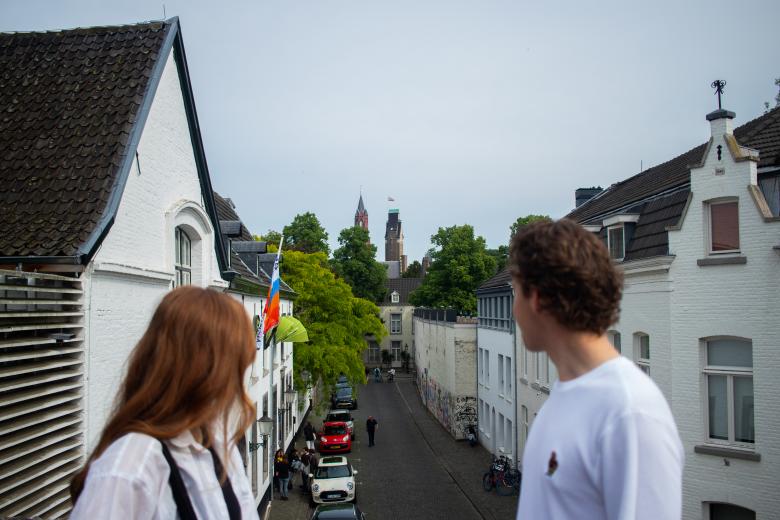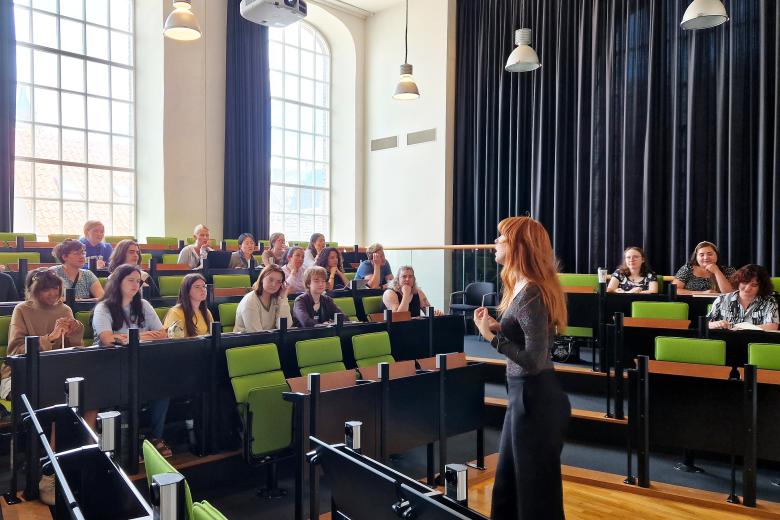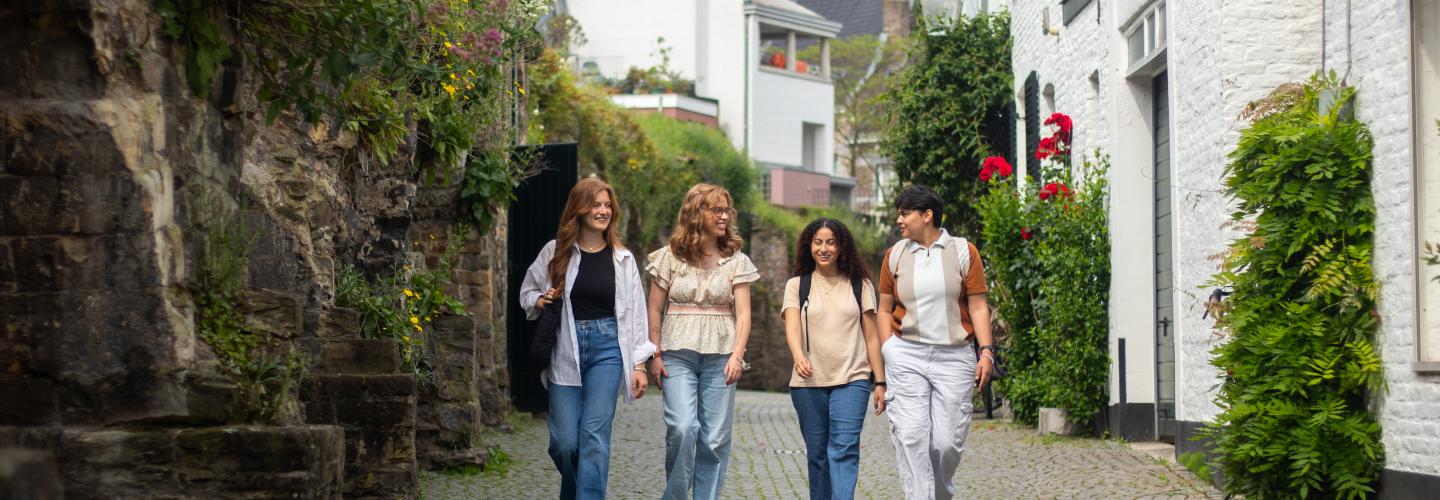Why this programme?
Maastricht, the Netherlands, is the perfect location to examine modern European health care research policies and challenges. With Germany and Belgium only a stone’s throw away, cross-border health options and differences in medical practices are a reality for every patient and health care provider in Maastricht. The Netherlands is consistently positioned at the top of the Euro Health Consumer Index and other global rankings and is known for controversial medical practices such as high rates of home births, medical marijuana and legalised euthanasia.
Gain a greater understanding of public health policies and medical achievements and practice in Europe. Discover projects and institutions engaged in promoting health locally in a globalised world. Examine the different attitudes to health in various European countries and compare their health care systems with the market driven system of the United States. Deepen your knowledge of genetics, immunology or biology, gain insight into contemporary European health issues, discuss medical case studies and develop practical and clinical skills.
At CES we have a small team of young-hearted, dedicated people ready to help you, so you can focus on the things that really matter during your stay abroad.
Fast facts
- Company visits, guest lectures and practical tours of cutting-edge health institutes
- Combines strong academics with integrated field trips and unique hands-on experiences
- Choose from more than 400 bachelor courses in English
- Quarter, semester, year
- Direct enrolment
Join our programme
Would you like to join our programme? Please take note of the following programme dates:
| Spring 2025: | Fall 2025: |
Friday 17 January - Saturday 7 June* | Friday 15 August - Saturday 20 December
|
*Depending on class selection
Latest advances in psychological research
Students are directly enrolled at Maastricht University (UM) and able to take classes at the prestigious Faculty of Health, Medicine and Life Sciences (FHML) , the Center for European Studies (CES) and the highly-acclaimed Faculty of Science and Engineering (FSE).
The courses I took in this programme deepened my interest in health care and medicine. I believe I will be a stronger, more well-rounded health care provider because of the content, discussions and people who made up the programme.
Hope Barrett | Case Western Reserve UniversityIntroduction
The programme starts with a two-week introduction, which includes CES services, the Dutch Discovery Trip, a tour of Maastricht and the surrounding area, UM orientation, a Problem-Based Learning (PBL) workshop, a cultural awareness lecture and integration into Dutch student life.
Dutch Discovery Trip
Our Dutch Discovery Trip is an exciting journey through the Netherlands, where students will immerse themselves in culture, history and unique experiences at iconic sites such as Kinderdijk.
Paris Cultural Weekend
Students will discover the grand boulevards and renowned architecture of the City of Light, and experience its rich history, artistic beauty and cuisine.
Brussels Weekend Trip
During this trip, students will experience Brussels’ perfect blend of historic charm and vibrant, modern energy. From the grandeur of the Grand Place to the city’s hidden treasures, there’s so much to discover.
Credits
Maastricht University uses the ECTS (European Credit Transfer System) to measure academic progress. Maastricht University courses typically have between 5-12 ECTS credits. How ECTS credits transfer depends on a student’s home university or college. Generally a 5-6.5 ECTS course is the equivalent of a full semester course (3 American credit hours).
You can earn a minimum of 24 and maximum of 32 ECTS credits per semester at CES. This is considered a full semester workload and usually transfers back as 15 American credit hours. CES advisors help students select classes to meet the requirements of their home university.

High academic standard
CES programmes are designed for enthusiastic and intellectually curious students dedicated to expanding their academic horizons while abroad. To ensure that students do well, CES offers extensive academic advising, workshops and regular monitoring. Maastricht University uses Problem-Based Learning (PBL), a student-centered teaching approach. Small groups of students (12-15) work on academic or practical cases prepared by their professors. Faculty act as guides to students who are in charge of their own learning and are expected to be committed, active and self-motivated.

Workload
During a regular course (5-6.5 ECTS credits), students spend an average of 4-6 hours in class per week. For every hour in class students are expected to spend an additional 2-3 hours on study. The total workload for two regular courses or one intensive course is around 40 hours per week.

Admission requirements
Acceptance to the open enrolment programmes is competitive and early application is recommended. While most students participating in our open enrolment programmes are undergraduates at the junior or senior level, applications by motivated students at the sophomore and/or freshman level with a good GPA will be considered too.
You should have a minimum GPA of 3.0 in order to apply for a CES open enrolment programme. If you have a lower GPA you can request to be considered if you can show a recommendation from a professor or academic advisor at your home university or college with specific details about your academic development so far.
Applicants must be proficient in English. Non-native speakers are required to demonstrate proof of English language proficiency.
Students with an International Baccalaureate or European Baccalaureate diploma are exempted, as are EU-nationals. International students who are enrolled as fulltime students at university or college in a native-speaking country where English is the language of instruction are also exempted.
All other prospective students must present a current TOEFL (Test of English as a Foreign Language) or IELTS (International English Testing System), score before they can be admitted.
Your TOEFL test score has to be at least:
- 575 points (paper-based version)
- 230 points (computer-based version)
90 (internet-based version)
Your IELTS test score must be at least 6.5.
Admission and registration
Application procedure
Complete and submit the online application and send all additional information mentioned below via email to your coordinator. Your CES coordinators will contact you within a week after receiving your application and additional information to assist you in the registration process and the preparations for your stay in Maastricht.
Additional required information
- Official transcript
- Letter of recommendation from teacher or study abroad advisor
- Motivation letter
- One full colour passport picture (digital, in jpeg format)
- Scan or a clear copy of your passport (information page with photo and any other pages with stamps etc)
Regarding the criteria for the motivation letter, CES staff are interested in what inspires a student to apply. Why are they drawn to this programme, to Maastricht University or to Europe? Students may want to highlight academics and certain courses, the culture, history or personal goals. The motivation letter should be 1-2 pages in length.
An academic letter of recommendation is a one page letter (approximately) that highlights a student's academic background, character, academic or career goals and other related interests or achievements. The letter expands upon a student's record or transcript, providing insight into what kind of student they are and their suitability for the programme. It should be written by a professor, academic or study abroad advisor.
Please note that once your course list is finalised you will receive a course approval form which you will need to fill in with the help of your home institution.
Application deadlines
- Spring: 1 October
- Fall: 1 April
Contact
Antonio Sanchez Ibarra
International Relations Officer
Monday - Friday
+ 31 43 388 5265
